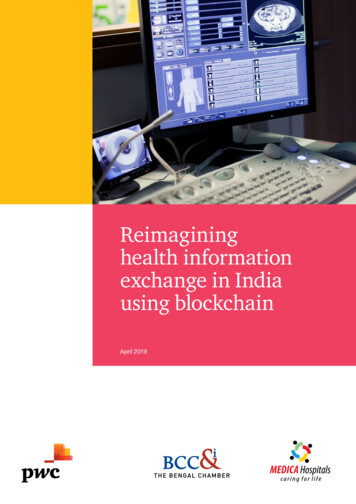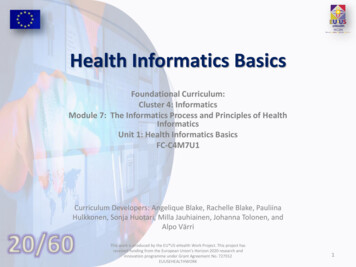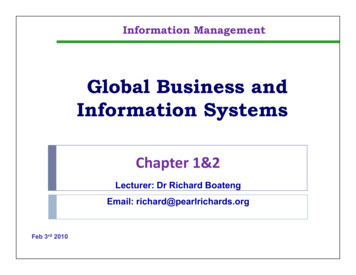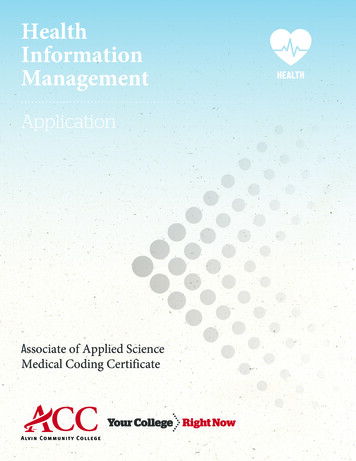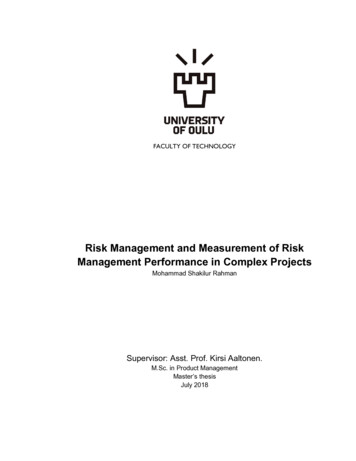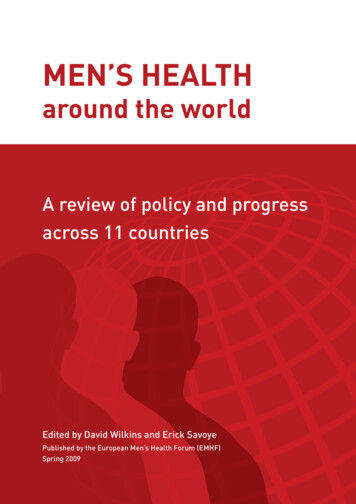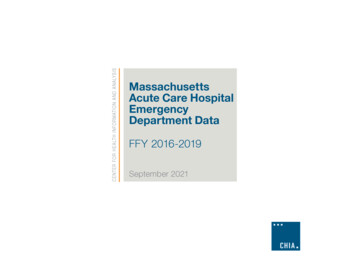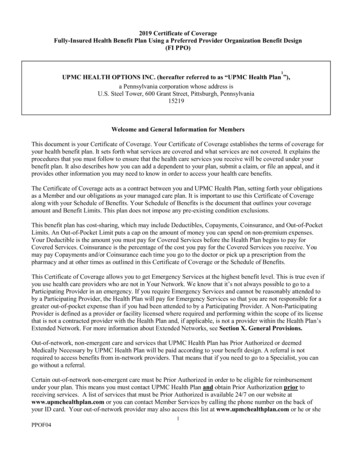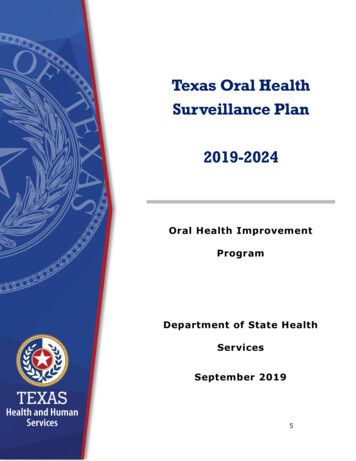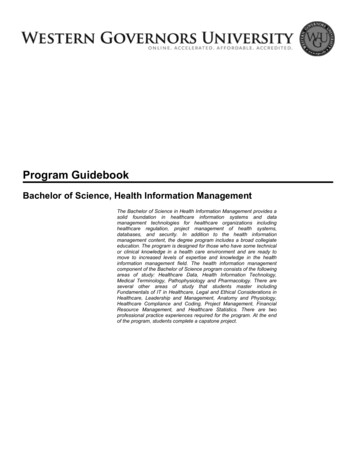
Transcription
Program GuidebookBachelor of Science, Health Information ManagementThe Bachelor of Science in Health Information Management provides asolid foundation in healthcare information systems and datamanagement technologies for healthcare organizations includinghealthcare regulation, project management of health systems,databases, and security. In addition to the health informationmanagement content, the degree program includes a broad collegiateeducation. The program is designed for those who have some technicalor clinical knowledge in a health care environment and are ready tomove to increased levels of expertise and knowledge in the healthinformation management field. The health information managementcomponent of the Bachelor of Science program consists of the followingareas of study: Healthcare Data, Health Information Technology,Medical Terminology, Pathophysiology and Pharmacology. There areseveral other areas of study that students master includingFundamentals of IT in Healthcare, Legal and Ethical Considerations inHealthcare, Leadership and Management, Anatomy and Physiology,Healthcare Compliance and Coding, Project Management, FinancialResource Management, and Healthcare Statistics. There are twoprofessional practice experiences required for the program. At the endof the program, students complete a capstone project.
Understanding the Competency-Based ApproachPractically speaking, how do competency-based programs like those offered at Western GovernorsUniversity (WGU) work? Unlike traditional universities, WGU does not award degrees based oncompletion of a certain number of credit hours or a certain set of required courses. Instead, you will earnyour degree by demonstrating your skills, knowledge, and understanding of important concepts.Progress through a degree program is governed not by the amount of time you spend in class but by yourability to demonstrate mastery of competencies as you complete required courses. Of course, you willneed to engage in learning experiences as you review competencies or develop knowledge and skills inareas in which you may be weak. To help you acquire the knowledge and skills you need to completeyour courses and program, WGU provides a rich array of learning resources. Your program mentor willwork closely with you to help you understand the competencies required for your program and to help youcreate a schedule for completing your courses. You will also work closely with course instructors as youengage in each of your courses. As subject matter experts, course instructors will guide you through thecontent you must master to pass the course assessments.The benefit of this competency-based system is that enables students who are knowledgeable about aparticular subject to make accelerated progress toward completing a degree, even if they lack collegeexperience. You may have gained skills and knowledge of a subject while on the job, accumulatedwisdom through years of life experience, or already taken a course on a particular subject. WGU willaward your degree based on the skills and knowledge that you possess and can demonstrate—not thenumber of credits hours on your transcript.AccreditationWestern Governors University is the only university in the history of American higher education to haveearned accreditation from four regional accrediting commissions. WGU's accreditation was awarded by(1) the Northwest Commission on Colleges and Universities, (2) the Higher Learning Commission of theNorth Central Association of Colleges and Schools, (3) the Accrediting Commission for Community andJunior Colleges of the Western Association of Schools and Colleges, and (4) the Accrediting Commissionfor Senior Colleges and Universities of the Western Association of Schools and Colleges. The university’saccreditation status is now managed by the Northwest Commission on Colleges and Universities(NWCCU), which reaffirmed WGU’s accreditation in February February 2020. The WGU TeachersCollege is accredited at the initial-licensure level by the Council for the Accreditation of EducatorPreparation (CAEP) and by the Association for Advancing Quality in Educator Preparation (AAQEP). Thenursing programs are accredited by the Commission on Collegiate Nursing Education (CCNE). TheHealth Information Management program is accredited by the Commission on Accreditation for HealthInformatics and Information Management Education (CAHIIM). The College of Business programs areaccredited by the Accreditation Council for Business Schools and Programs (ACBSP).The Degree PlanThe focus of your program is your personalized Degree Plan. The Degree Plan is a detailed blueprint ofthe courses you will need to complete in order to earn your degree. The Degree Plan also lays out theaccompanying learning resources and assessments that compose your program. The list of courses inthe Degree Plan is often referred to as the standard path. The amount of time it takes to complete yourprogram depends on both the amount of new information you need to learn and the amount of time youplan to devote each week to study. Your program mentor and course instructors will help you assess yourstrengths and development needs to establish a study plan.Students vary widely in the specific skills and information they need to learn. For example, some studentsmay be highly knowledgeable in a particular subject matter and would not need to engage in new learningopportunities. Other students may find that portions of the program require them to learn new informationand that they need to take an online class or participate in a study module to acquire the knowledge andskills needed to fulfill program competencies in that area. Some individuals may be able to devote as littleBSHIM 202109 2019 Western Governors University 6/24/212
as 15–20 hours per week to the program, while others may need to devote more time. For this reason,pre-assessments are there to help your program mentor form a profile of your prior knowledge and createa personalized Degree Plan.How You Will Interact with FacultyAt WGU, faculty serve in specialized roles, and they will work with you individually to provide theguidance, instruction, and support you will need to succeed and graduate. As a student, it is important foryou to take advantage of this support. It is key to your progress and ultimate success. Upon yourenrollment, you will be assigned a program mentor—an expert in your field of study who will provide youwith regular program-level guidance and support from the day you start until the day you graduate. Yourprogram mentor will set up regular telephone appointments (weekly at first) with you, which you will beexpected to keep. The mentor will review program competencies with you and work with you to develop aplan and schedule for your coursework. Your program mentor will serve as your main point of contactthroughout your program—helping you set weekly study goals, recommending specific learning materials,telling you what to expect in courses, and keeping you motivated. In addition to regular calls, yourprogram mentor is available to help you resolve questions and concerns as they arise.You will also be assigned to a course instructor for each course. Course instructors are doctoral-levelsubject matter experts who will assist your learning in each individual course. When you begin a newcourse, your assigned course instructor will actively monitor your progress and will be in touch to offerone-on-one instruction and to provide you with information about webinars, cohort sessions, and otherlearning opportunities available to help you acquire the competencies you need to master the course.Your course instructor can discuss your learning for the course, help you find answers to contentquestions, and give you the tools to navigate the course successfully. In addition, you will communicatewith course instructors by posting in the online learning community and participating in live discussionsessions such as webinars and cohorts.For many of the courses at WGU, you will be required to complete performance assessments. Theseinclude reports, papers, presentations, and projects that let you demonstrate your mastery of the requiredcompetencies. A separate group of faculty members, called evaluators, will review your work todetermine whether it meets requirements. Evaluators are also subject matter experts in their field ofevaluation. If your assessment needs further work before it “passes,” these evaluators, who review yourwork anonymously, will provide you with instructional feedback to help you meet evaluation standardsand allow you to advance.Connecting with Other Mentors and Fellow StudentsAs you proceed through your Degree Plan, you will have direct contact with multiple faculty members.These communications can take a variety of forms, including participation in one-on-one discussions,chats in the learning communities, and live cohort and webinar opportunities. As a WGU student, you willhave access to your own personal MyWGU Student Portal, which will provide a gateway to your coursesof study, learning resources, and learning communities where you will interact with faculty and otherstudents.The learning resources in each course are specifically designed to support you as you developcompetencies in preparation for your assessments. These learning resources may include readingmaterials, videos, tutorials, cohort opportunities, community discussions, and live discussions that areguided by course instructors who are experts in their field. You will access your program communityduring your orientation course to network with peers who are enrolled in your program and to receivecontinued support through professional enrichment and program-specific chats, blogs, and discussions.WGU also provides Student Services associates to help you and your program mentor solve any specialproblems that may arise.OrientationBSHIM 202109 2019 Western Governors University 6/24/213
The WGU orientation course focuses on acquainting you with WGU’s competency-based model, distanceeducation, technology, and other resources and tools available for students. You will also utilize WGUprogram and course communities, participate in activities, and get to know other students at WGU. Theorientation course must be completed before you can start your first term at WGU.Transferability of Prior College CourseworkBecause WGU is a competency-based institution, it does not award degrees based on credits but ratheron demonstration of competency. However, if you have completed college coursework at anotheraccredited institution, or if you have completed industry certifications, you may have your transcripts andcertifications evaluated to determine if you are eligible to receive some transfer credit. The guidelines fordetermining what credits will be granted varies based on the degree program. Students entering graduateprograms must have their undergraduate degree verified before being admitted to WGU. To review moreinformation in regards to transfer guidelines based on the different degree programs, you may visit theStudent Handbook found at the link below and search for “Transfer Credit Evaluation.”Click here for the Student HandbookWGU does not waive any requirements based on a student's professional experience and does notperform a "résumé review" or "portfolio review" that will automatically waive any degree requirements.Degree requirements and transferability rules are subject to change in order to keep the degree contentrelevant and current.Remember, WGU's competency-based approach lets you take advantage of your knowledge and skills,regardless of how you obtained them. Even when you do not directly receive credit, the knowledge youpossess may help you accelerate the time it takes to complete your degree program.Continuous Enrollment, On Time Progress, and Satisfactory AcademicProgressWGU is a “continuous enrollment” institution, which means you will be automatically enrolled in each ofyour new terms while you are at WGU. Each term is six months long. Longer terms and continuousenrollment allow you to focus on your studies without the hassle of unnatural breaks between terms thatyou would experience at a more traditional university. At the end of every six-month term, you and yourprogram mentor will review the progress you have made and revise your Degree Plan for your next sixmonth term.WGU requires that students make measurable progress toward the completion of their degree programsevery term. We call this “On-Time Progress,” denoting that you are on track and making progress towardon-time graduation. As full-time students, graduate students must enroll in at least 8 competency unitseach term, and undergraduate students must enroll in at least 12 competency units each term.Completing at least these minimum enrollments is essential to On-Time Progress and serves as abaseline from which you may accelerate your program. We measure your progress based onthe coursesyou are able to pass, not on your accumulation of credit hours or course grades. Every time you pass acourse, you are demonstrating that you have mastered skills and knowledge in your degree program. Forcomparison to traditional grading systems, passing a course means you have demonstrated competencyequivalent to a “B” grade or better.WGU assigns competency units to each course in order to track your progress through the program. Acompetency unit is equivalent to one semester credit of learning. Some courses may be assigned 3competency units while others may be as large as 12 competency units.Satisfactory Academic Progress (SAP) is particularly important to students on financial aid because youmust achieve SAP in order to maintain eligibility for financial aid. We will measure your SAP quantitativelyby reviewing the number of competency units you have completed each term. In order to remain in goodBSHIM 202109 2019 Western Governors University 6/24/214
academic standing, you must complete at least 66.67% of the units you attempt over the length of yourprogram—including any courses you add to your term to accelerate your progress. Additionally, duringyour first term at WGU you must pass at least 3 competency units in order to remain eligible for financialaid. We know that SAP is complex, so please contact a financial aid counselor should you have additionalquestions. *Please note: The Endorsement Preparation Program in Educational Leadership is not eligiblefor federal financial aid.CoursesYour Degree Plan includes courses needed to complete your program. To obtain your degree, you will berequired to demonstrate your skills and knowledge by completing the assessment(s) for each course. Ingeneral there are two types of assessments: performance assessments and objective assessments.Performance assessments contain, in most cases, multiple scored tasks such as projects, essays, andresearch papers. Objective assessments include multiple-choice items, multiple-selection items,matching, short answer, drag-and-drop, and point-and-click item types, as well as case study and videobased items. Certifications verified through third parties may also be included in your program. Moredetailed information about each assessment is provided in each course of study.Learning ResourcesWGU works with many different educational partners, including enterprises, publishers, trainingcompanies, and higher educational institutions, to provide high-quality and effective learning resourcesthat match the competencies you are developing. These vary in type, and may be combined to create thebest learning experience for your course. A learning resource can be an e-textbook, online module, studyguide, simulation, virtual lab, tutorial, or a combination of these. The cost of most learning resources areincluded in your tuition and Learning Resource Fee. They can be accessed or enrolled for through yourcourses. Some degree-specific resources are not covered by your tuition, and you will need to coverthose costs separately. WGU also provides a robust library to help you obtain additional learningresources, as needed.Mobile Compatibility:The following article provides additional details about the current state of mobile compatibility for learningresources at WGU. It includes a list that can be referenced to determine the mobile friendliness of all corecourse materials used in a program.Student Handbook article: Can I use my mobile device for learning resources?Standard PathAs previously mentioned, competency units (CUs) have been assigned to each course in order tomeasure your academic progress. If you are an undergraduate student, you will be expected to enroll in aminimum of 12 competency units each term. Graduate students are expected to enroll in a minimum of 8competency units each term. A standard plan for a student for this program who entered WGU withoutany transfer units would look similar to the one on the following page. Your personal progress can befaster, but your pace will be determined by the extent of your transfer units, your time commitment, andyour determination to proceed at a faster rate.BSHIM 202109 2019 Western Governors University 6/24/215
Standard Path for Bachelor of Science, Health Information ManagementCourse DescriptionCUsTermProfessional Leadership and Communication for Healthcare21Foundations in Healthcare Information Management41Healthcare Ecosystems31Composition: Writing with a Strategy31Composition: Successful Self-Expression32Introduction to Communication: Connecting with Others32American Politics and the US Constitution32Medical Terminology32Anatomy and Physiology I43Introduction to Humanities33Applied Algebra33Introduction to Biology33Pathophysiology34Introduction to Pharmacology34Foundations in Healthcare Data Management34Healthcare Information Systems Management34Critical Thinking: Reason and Evidence35Introduction to Medical Coding35Health Information Law and Regulations45Introduction to Psychology35Healthcare Reimbursement46Quality and Performance Management and Methods46Introduction to Healthcare IT Systems46Data Analytics and Information Governance47Healthcare Compliance37Classification Systems47Healthcare Financial Resource Management47Applied Healthcare Statistics48Healthcare Statistics and Research38Professional Practice Experience I: Technical38Principles of Management in Health Information Management38Healthcare Project Management39Healthcare System Applications49Organizational Leadership in Healthcare39Professional Practice Experience II: Management49BSHIM 202109 2019 Western Governors University 6/24/216
Course DescriptionHealth Information Management CapstoneCUsTerm410Changes to CurriculumWGU publishes an Institutional Catalog, which describes the academic requirements of each degreeprogram. Although students are required to complete the program version current at the time of theirenrollment, WGU may modify requirements and course offerings within that version of the program tomaintain the currency and relevance of WGU’s competencies and programs. When programrequirements are updated, students readmitting after withdrawal from the university will be expected tore-enter into the most current catalog version of the program.BSHIM 202109 2019 Western Governors University 6/24/217
Areas of Study for Bachelor of Science, Health InformationManagementThe following section includes the areas of study in the program, with their associated courses. Yourspecific learning resources and level of instructional support will vary based on the individualcompetencies you bring to the program and your confidence in developing the knowledge, skills, andabilities required in each area of the degree. The Degree Plan and learning resources are dynamic, soyou need to review your Degree Plan and seek the advice of your mentor regarding the resources beforeyou purchase them.Foundations of SuccessProfessional Leadership and Communication for HealthcareThe Professional Communication and Leadership in Healthcare course is designed to help students prepare for success inthe online environment at Western Governors University and beyond. Student success starts with the social support andself-reflective awareness that will prepare students to weather the challenges of academic programs. In this course studentswill participate in group activities and complete several individual assignments. The group activities are aimed at findingsupport and gaining insight from other students. The assignments are intended to give the student an opportunity to reflectabout where they are and where they would like to be. The activities in each group meeting are designed to give studentsseveral tools they can use to achieve success. This course is designed as a five-part intensive learning experience.Students will attend five group meetings during the term. At each meeting students will engage in activities that help themunderstand their own educational journey and find support and inspiration in the journey of others.This course covers the following competencies: The graduate evaluates and displays behaviors consistent with the process of self-discovery and mindfulness. The graduate demonstrates the ability to apply the concept of working styles to leadership skills. The graduate demonstrates appropriate patterns of effective communication. The graduate identifies and applies appropriate communication strategies to develop a supportive community of peers.Health Information TechnologyFoundations in Healthcare Information ManagementFoundations in Healthcare Information Management applies theories from business, IT, management, medicine, andconsumer-centered healthcare skills. Students will learn to evaluate and analyze health information systems forimplementation in health information management. There are no prerequisites for this course.This course covers the following competencies: Begin your course by discussing your course planning tool report with your instructor and creating your personalizedcourse plan together. The graduate analyzes electronic health records (EHR) applications to support organizational leadership in theplanning and implementation of a health information system. The graduate evaluates an organization’s medical practice workflow, functional needs of end-users, data infrastructure,and information technology systems and processes, specifically during adoption phases of health information systems. The graduate evaluates a vendor negotiation strategy for the implementation of an electronic health record (EHR). The graduate evaluates various types of healthcare delivery systems to support the diverse requirements of eachsetting, including acute care, ambulatory care, health information exchanges, and the personal health record forhealthcare consumers. The graduate applies the principles of project management for project planning and development, launch, andevaluating specific project ideas in healthcare organizations.Introduction to Medical CodingIntroduction to Medical Coding provides students with the foundation for translating medical terminology into correctdiagnosis and procedure codes. The course focuses on how diagnosis and procedure codes are used to accuratelydocument medical records and inform accurate medical billing. This course introduces the Current Procedural Terminology(CPT), International Classification of Diseases (ICD-10-CM), ICD-10-PCS, and Healthcare Common Procedure CodingBSHIM 202109 2019 Western Governors University 6/24/218
System (HCPCS) code sets as well as ethical considerations throughout processes in medical coding. There are noprerequisites for this course.This course covers the following competencies: The learner assigns correct diagnosis and procedure codes to patient records using Current Procedural Terminology(CPT), Healthcare Common Procedure Coding System (HCPCS), and International Classification of Diseases (ICD-10CM, ICD-10-PCS) code sets. The learner applies ethical standards to medical coding situations.Healthcare ManagementHealthcare EcosystemsHealthcare Ecosystems explores the history and state of healthcare organizations in an ever-changing environment. Thiscourse covers how agencies influence healthcare delivery through legal, licensure, certification, and accreditation standards.The course will also discuss how new technologies and trends keep healthcare delivery innovative and current.This course covers the following competencies: Begin your course by discussing your course planning tool report with your instructor and creating your personalizedcourse plan together. The graduate analyzes the implications of key historic, economic, social, and legislative events that influenced theevolution of medical care in the United States, including the roles of health professionals and technology in theorganization of contemporary healthcare systems. The graduate analyzes how the components and operation of healthcare delivery systems across the continuum ofpatient care influence cost, access, and quality of care. The graduate analyzes how licensing, certification, and accreditation agencies for healthcare organizations impacthealthcare delivery at federal, state, local, and organizational levels. The graduate analyzes how relationships between clinical healthcare quality, reimbursement for services, and patientaccess to medical care influence the services that are provided at various levels of healthcare organizations. The graduate analyzes how federal legislation and programs influence the provision of services at all levels ofhealthcare organizations. The graduate analyzes how emerging technologies and trends in healthcare informatics and medical practice, as wellas federal government initiatives, impact contemporary healthcare delivery.Medical TerminologyMedical Terminology focuses on the basic components of medical terminology and how terminology is used whendiscussing various body structures and systems. Proper use of medical terminology is critical for accurate and clearcommunication among medical staff, health professionals, and patients. In addition to the systems of the body, this coursewill discuss immunity, infections, mental health, and cancer.This course covers the following competencies: Begin your course by discussing your course planning tool report with your instructor and creating your personalizedcourse plan together. The graduate accurately identifies primary and secondary word parts and forms of basic medical terms. The graduate accurately identifies medical terms associated with the urinary system in context with anatomicalstructures and physiological and pathophysiological functions of the human body. The graduate accurately identifies medical terms associated with reproductive systems in context with anatomicalstructures and physiological and pathophysiological functions of the human body. The graduate accurately identifies medical terms associated with body structure in context with anatomical structuresand physiological and pathophysiological functions of the human body. The graduate accurately identifies medical terms associated with the integumentary system in context with anatomicalstructures and physiological and pathophysiological functions of the human body. The graduate accurately identifies medical terms associated with the special senses of the eye and ear in context withanatomical structures and physiological and pathophysiological functions of the human body. The graduate accurately identifies medical terms associated with the musculoskeletal system in context withBSHIM 202109 2019 Western Governors University 6/24/219
anatomical structures and physiological and pathophysiological functions of the human body. The graduate accurately identifies medical terms associated with the digestive system in context with anatomicalstructures and physiological and pathophysiological functions of the human body. The graduate accurately identifies medical terms associated with the cardiovascular and lymphatic systems in contextwith anatomical, physiological and pathophysiological functions related to immunity and infections of the human body. The graduate accurately identifies medical terms associated with the respiratory system in context with anatomicalstructures and physiological and pathophysiological functions of the human body. The graduate accurately identifies medical terms associated with the endocrine and nervous systems in context withanatomical structures and physiological and pathophysiological functions of the human body.PathophysiologyPathophysiology is an overview of the pathology and treatment of diseases in the human body and its systems. This coursewill explain the processes in the body that result in the signs and symptoms of disease, as well as therapeutic procedures inmanaging or curing the disease. The content draws on a knowledge of anatomy and physiology to understand how diseasesmanifest themselves and how they affect the body.This course covers the following competencies: Begin your course by discussing your course planning tool report with your instructor and creating your personalizedcourse plan together. The graduate examines how the organization of the human body and body systems, including tissues, glands andmembranes, relates to the physiological functions of the body and impacts disease processes. The graduate examines common disorders of the musculoskeletal and integumentary systems and associatesappropriate diagnostic tests and therapeutic procedures with these disorders. The graduate examines common disorders of the central nervous system, peripheral nervous system, and sensoryorgans and associates appropriate diagnostic tests and therapeutic procedures with these disorders. The graduate examines common disorders of the cardiovascular, circulation, lymphatic, and immune systems andassociates appropriate diagnostic te
nursing programs are accredited by the Commission on Collegiate Nursing Education (CCNE). The Health Information Management program is accredited by the Commission on Accreditation for Health Informatics and Information Management Education (CAHIIM). The College of Business programs are accredited by the Accreditation Council for Business .
